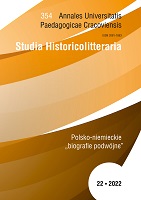Uwalnianie się od prymatu pamięci albo oswajanie obcości... Tożsamościowe transformacje w Hamlecie gliwickimPiotra (Petera) Lachmanna
Freeing oneself from the primacy of memory or taming strangeness. Identity transformations in Peter (Piotr) Lachmann’s Gliwice Hamlet. Rehearsal or Touch through the Pane
Author(s): Przemysław ChojnowskiSubject(s): Cultural history, Political history, Social history, German Literature, Polish Literature, Social Theory, Sociology of Culture, Theory of Literature, Sociology of Literature
Published by: Wydawnictwo Uniwersytetu Komisji Edukacji Narodowej w Krakowie
Keywords: Peter (Piotr) Lachmann; liminality; memory; bilingualism; palimpsest; alienation / strangeness; identity;
Summary/Abstract: This paper is an analysis of Hamlet gliwicki [eng. Gliwice Hamlet] (Messel 2008) by the Polish-German writer Peter Lachmann (b. 1935). The article presents the genesis of the drama inspired by the fate of a Wehrmacht soldier lost during the Battle of Stalingrad in January 1942. This is the writer’s father Ewald Lachmann. In addition to the parodic means used in the play, the intertextual links between Gliwice Hamlet and William Shakespeare’s Hamletare discussed, as well as the topoi of Shakespearean tragedy interwoven with episodes from Lachmann’s biography and events from the history of Gliwice. The figure of Hamlet takes on the role of a mask and functions as a universal archetype behind which the play’s creator himself hides. The bilingualism of Peter – the play’s protagonist – and the overlapping of two identities, Polish and German, are examined in terms of a palimpsest. The analysis shows that Lachmann’s drama is characterised by the lack of a linear course of events and their anchoring in a fluid, liminal space-time. The protagonist’s identity transformations are accompanied by the transformation of his immediate environment, as the German city of Gleiwitz turns into the Polish city of Gliwice.
Journal: Annales Universitatis Paedagogicae Cracoviensis. Studia Historicolitteraria
- Issue Year: 2022
- Issue No: 22
- Page Range: 305-331
- Page Count: 27
- Language: Polish

